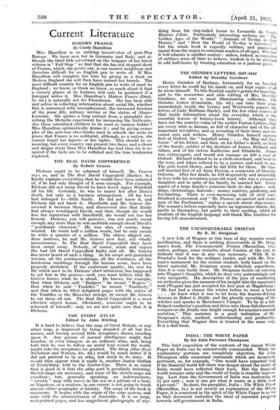THE OXINDEN LETTERS, 1607-1642 Edited by Dorothy Gardiner
Henry Oxinden of Barham, fortunately for us, hoarded every letter he could lay his hands on, and kept copies of all he wrote himself. To this Kentish squire's genius for hoarding, and to the researches and able editing of Mrs. Dorothy Gardiner, we owe a- most illuminating collection. The Minden Letters. (Constable, 12s. 6d.) can take their place immediately beside the Verney and Wentworth papers, the letters of Lady Brilliana Harley, and the few other sources of that inside information about the everyday which is the essential leaven of history-book history. Although they have not the scarcity-value of the earlier Paston Letters, they are every whit as human, as full of character and of the all- important trivialities, and as revealing of their times and cir- cumst: aces and . writers. Henry Oxinden himself appears first at Oxford, the " hopefull sonne . . . . the Map and Epi- tomie " of his father, and then, on his father's death, as head of the family, arbiter of the destinies of James, Richard, and Adam, and or his sisters Katherine and Elizabeth. James was extravagant, and would not manage on £20 a year at Oxford. Richard refused to be a cloth-merchant, and went to the wars, and Adam refused to be a mercer, and went to sea. The girls bored Henry, and he did little for them. He him- self married first of all Anne Peyton, a connexion of Dorothy Osborne. After her death, he fell desperately and unsuitably in love with his seventeen-year-old ward, who was a yeoman's daughter, and in spite of his family, he married her. Every aspect of a large family's concerns finds its due place : wed- dings, christenings, funerals ; money matters, gardening and fox-hunting. , There is ever-increasing talk of civil war: Strafford is executed, and " Mr. Pimme, an ancient and stoute man of the Parliament," makes a speech about ship-money. The women's letters especially have an ingenuous chan', due partly to themselves, but partly to their spelling, which all students of the English language will thank Mrs. Gardiner for having left unmodernized.






































 Previous page
Previous page